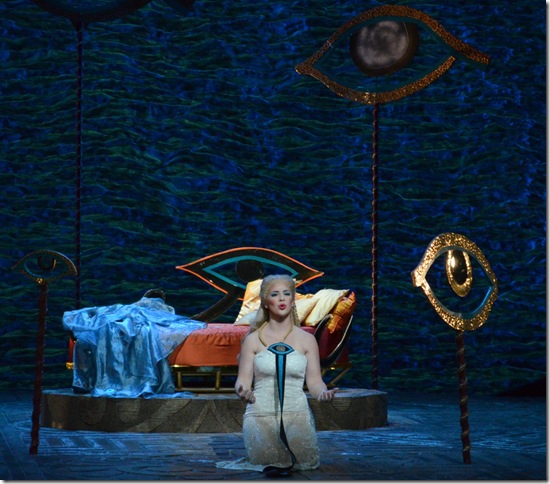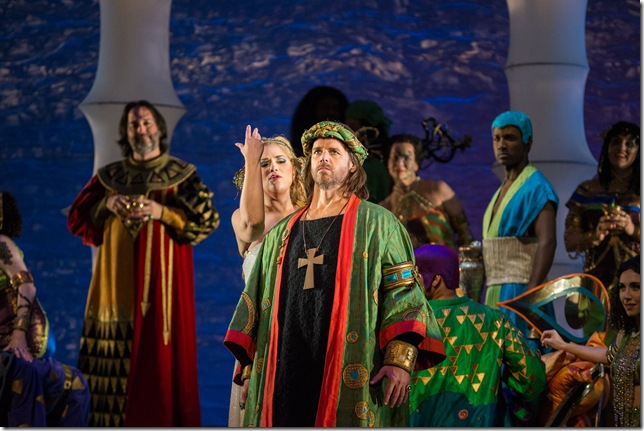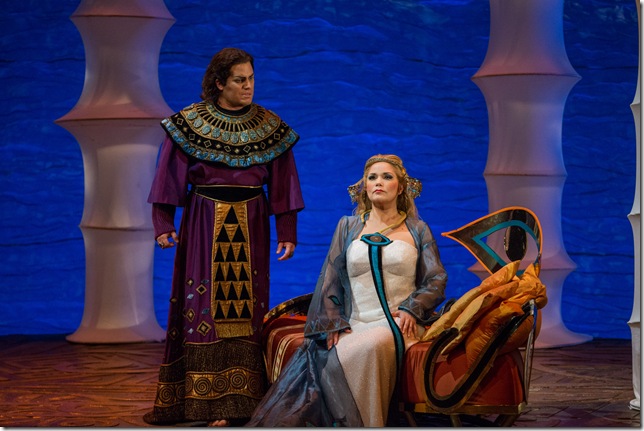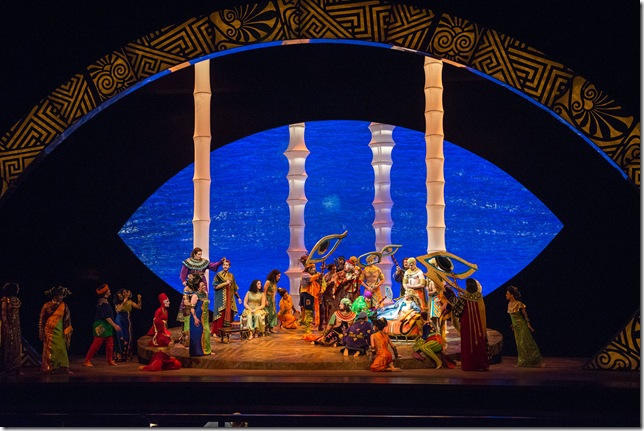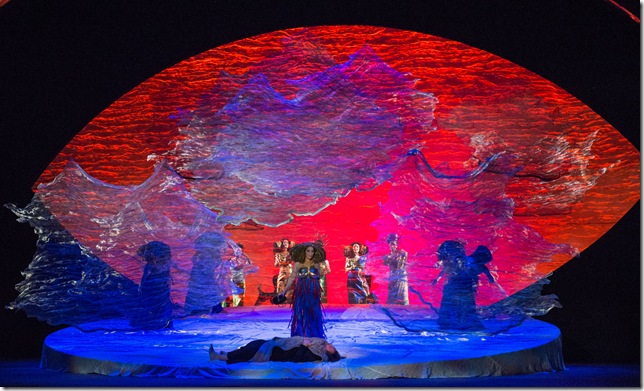The operas of Jules Massenet are not as admired today as they once were in the last 20 years of the 19th century, when works such as Manon, Werther, Sapho and many others made the industrious French composer a wealthy and famous man.
He has been much abused by history for his willingness to cater to the mass taste of his day and making no absolutely bones about it. “I don’t believe in all that creeping-Jesus stuff, but the public likes it, and we must always agree with the public,” he wrote to a fellow composer, Vincent d’Indy, in a statement that for artists who value integrity to personal vision above everything else would seem to be the very definition of taking the easy way out.
But as Florida Grand Opera’s season-closing production of Massenet’s Thaïs demonstrates, the composer knew how to reach the people filling his seats, and this 1894 tale of pleasures of the flesh vs. the self-abnegating joys of the spirit is something that still strongly resonates with us today. What, indeed, is the most admirable way to live: in selfless devotion to God, or in full communion with another human being?
The music of Thaïs is only known today through its Méditation, a violin solo from Act II that is still immensely popular with every rising violinist today who wants to play a surefire piece for an audience. It is essentially salon music, but perhaps comes in just a shade higher than that because of its bridge section and some of its harmonic felicities. The rest of the score is melodically attractive if not distinguished, but while Massenet also has been criticized for aping the easy sweetness of his compatriot Charles Gounod, Massenet has much more discipline than the older composer, and if the choices he makes are not profound, he makes the most of them.
All of which brings us back to Florida Grand Opera, which has again cast some excellent voices in its lead roles for an opera that is very demanding not just for its soprano heroine and its baritone male protagonist, but also requires a first-rate tenor for a secondary role of Thaïs’s most recent paramour. Saturday night’s performance at the Ziff Ballet Opera House in Miami featured the second-cast soprano, Illinois native Angela Mortellaro, in the role of Thaïs (the other four performances are being sung by the fine Cuban-born soprano Eglise Gutiérrez).
Mortellaro was in fine voice Saturday night, interpolating a strong high D in her Dis moi que je suis belle in Act II as Thaïs, the most famous courtesan in ancient Alexandria, contemplates her mirror, begging for supernatural intervention to keep her from growing old, and hitting two more at the end of Act III as spiritual ecstasy takes over and she sees the very face of God. Mortellaro’s voice is clear and pretty, with plenty of power; her strength was perhaps a bit too much for the delicacy of Dis moi que je suis belle, which calls for a little more suavity and delicacy.
Her voice was at its most appealing in two sections where she was called on to sing a plain, beautiful line, particularly in Act II’s L’amour est un vertu rare, and in Act III, Et mon âme est pleine d’allegresse, then going into the duet with Athanaël, Baigne d’eau mes maines. In these instances, her voice had an honest sweetness about it that was most persuasive. Her acting was only serviceable in Thaïs’s moments of high distress, when she simply paced back and forth, but in Act III, she was endearing as a woman at the end of her physical trial and on the cusp of a transformation.
Bass-baritone Kristopher Irmiter, a South Carolinian, was an excellent Athanaël, with a virile, forceful tone quality that projected particularly well in his higher registers. He has the bulk of the stage time in this opera, and he carried it well, with a believably tortured acting job as a man coming apart under the pressure of emotions he didn’t know he had.
His one real duet with Thaïs in Act III demonstrated a lovely blend with Mortellaro’s voice, and he showed himself able to carry out a convincing dramatic argument in the Act II monologue Voilà donc la terrible cité, building surely to the end. Had this been a deeper opera, with Athanaël’s inner torment and transformation presented less matter-of-factly, it seems likely that Irmiter could have explored it profitably; one hopes to see him in the future in roles with greater intellectual challenges.
The Uruguayan tenor Martin Nusspaumer, who is something of a house favorite, sang a splendid Nicias, totally believable as a man living in splendor and enjoying the naughtier pleasures of life with a clear conscience. He has a big, creamy voice, distinctive in its color and sound, and very Italianate in its upper reaches, especially in his contribution to the Act II ensemble that begins with Thaïs’s Qui te fai si sévère, with its light Offenbachian flavor.
He is a handsome man as well in a big-star tenor way, which made his performance even more persuasive, but aside from FGO, his appearances have mostly been back home in Montevideo. Yet this is a tenor who would do well on many an American stage, and it’s high time some more companies took a look at him.
As Palémon, the California bass Adam Lau was excellent, as he always is, in another role that required him to don an enormous beard and wear a robe; he has a true bass voice with substantial gravity and a lovely tone quality. Soprano Riley Svatos and mezzo Caitlin McKechney, as Crobyle and Myrtale, respectively, sang very well, especially entering as they have to in Act II on a tricky melisma, which they did admirably. They were flirty and decadent in a mildly suburban way, but that was well-suited to director Renaud Doucet’s extremely cautious exploration of the sinful aspects of this opera.
Mezzo Raehan Bryce-Davis gave glimpses of a very pretty vocal quality in her short time on stage as Albine, and baritone Carlton Ford was sang his few lines as the servant in Nicias’s palace effectively. The chorus, led by Michael Sakir, was able enough, though the monks in Act I were somewhat underpowered. Still, their very quiet a cappella work at the end of the act was carefully and lovingly done.
FGO’s orchestra was wonderful, with concertmaster Scott Flavin taking a curtain call for his fine work on the Méditation. Conductor Ramón Tebar led it beautifully, and his inclination to overwork certain moments of high emotion paid off here, especially in the very opening scene in Act I, which in some respects contains the most interesting music in the opera. Tebar’s tempo was on the slow side, but it brought out mood and mystery and set the scene for what was to follow with a very attractive solemnity.
Tebar is donating his services for the six performances of Thaïs, which is hugely generous of him, though not such a good sign for company finances. His kind gesture is being promoted as part of a Match the Maestro donor campaign, and surely Florida Grand deserves substantial community support.
Director Doucet, along with his life and artistic partner André Barbe, have brought many quirky ideas to their stagings for FGO; one thinks of the Offenbach figure skittering around in Tales of Hoffmann, and their obsession with chairs in Carmen. Barbe’s costumes for the citizens of Alexandria were strikingly colorful, but his set design, which is based on an Eye of God motif in which a giant pupil at the back of the stage transformed into different backgrounds (such as the ocean in Act II), looked more like an enormous golden football than anything else.
Guy Simard’s lighting designs were distinctive and were elaborately deployed, but not always effective, primarily because the set itself, designed for Opera Theatre of St. Louis and accompanied by other eye standards hoisted aloft from time to time, looked clunky. Barbe’s concept is smart and canny and very portable; the palace in Act II is suggested by lighted columns that are flown in onto the central circle of the set, and the scrim was a series of ragged, translucent clouds. But in the Ziff it looked underwhelming, perhaps because today’s audiences are used to seeing high-quality imagery every day, and some of these ideas might have been better carried off with projections rather than actual physical props.
As I mentioned earlier, Doucet’s direction was almost puritan in its resistance to anything sexual, even though that is central to the plot. There were half-hearted suggestions of fellatio here and there, and when Mortellaro sang her climactic high C and tore off her top, there she was in a gold form-fitting maillot that looked almost like it was there for medical reasons.
No one’s asking anyone to be naked to make the plot work, but the citizens of the supposed Gomorrah that was ancient Alexandria were covered up almost as much as the nuns and the monks. Historically speaking, that’s in keeping with the way the opera has been staged since its debut (as far as my research indicates; Stefano Poda took a more frankly erotic approach at Turin in 2008), but I think the times require a different approach these days: Licentiousness and luxury are not demonstrated by beautiful costumes anymore.
In this opera, you have to have Athanaël react to something; he needs to be speechless with horror at all the steaminess going on, and today, I think that means people should be showing themselves off. Here, they just kind of wander in, dressed elaborately, laugh a little and wander off, having poked gentle high-school fun at Nicias’s bummer of a visitor. Again, no one needs pornography, but it does have to be obviously sexual; there has to be skin, there has to be a sense of people pushing it, of glorying in the flesh and the appetites thereof. In this Thaïs, there’s no meaningful contrast between the city and the austerity of the desert life.
But it is redeemed, as FGO has been this entire season, by a very strong cadre of singers who can deliver the goods and make the vision of its creators real sonically if not dramaturgically. Musically, this is as good a rendition of Massenet as he is likely to get in South Florida, and one recommends a visit to the final two performances in Fort Lauderdale this week to hear it.
THAÏS is being presented at 7:30 p.m. Thursday and Saturday at the Broward Center for the Performing Arts in Fort Lauderdale. The role of Thaïs will be sung by Eglise Gutiérrez. For tickets, call 1-800-741-1010 or the Broward Center at 954-462-0222.
